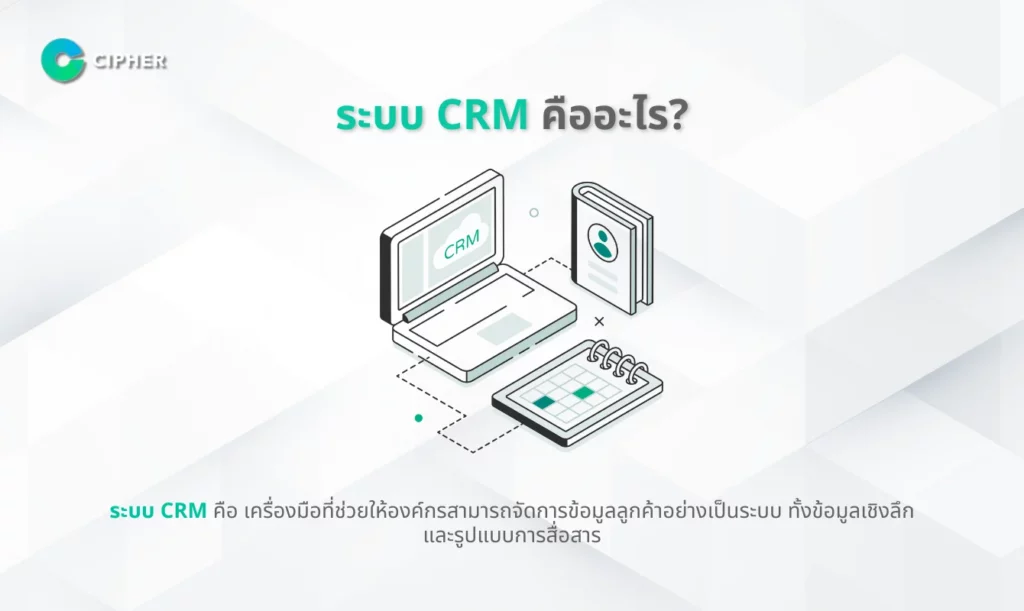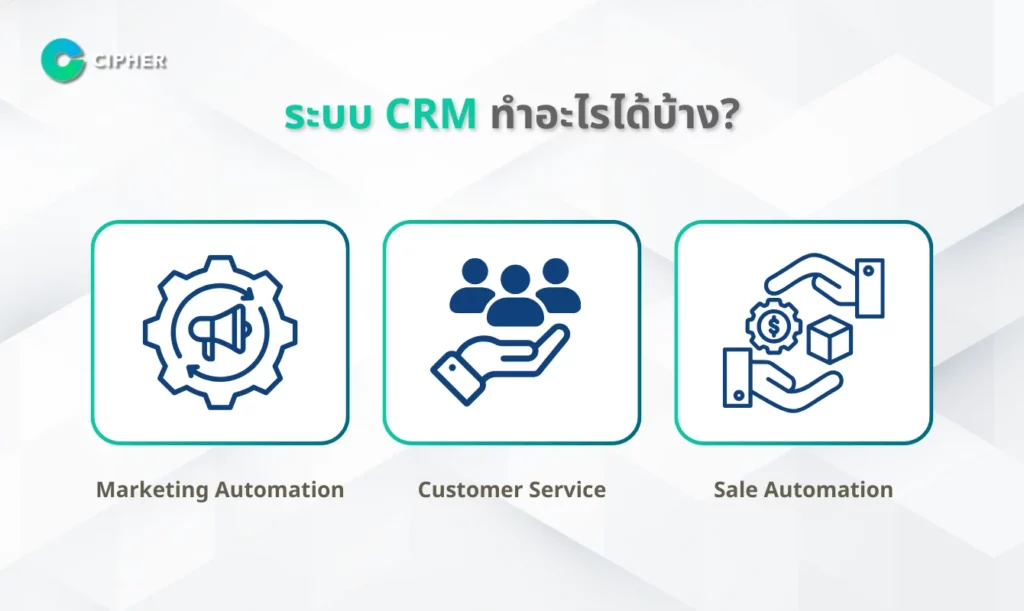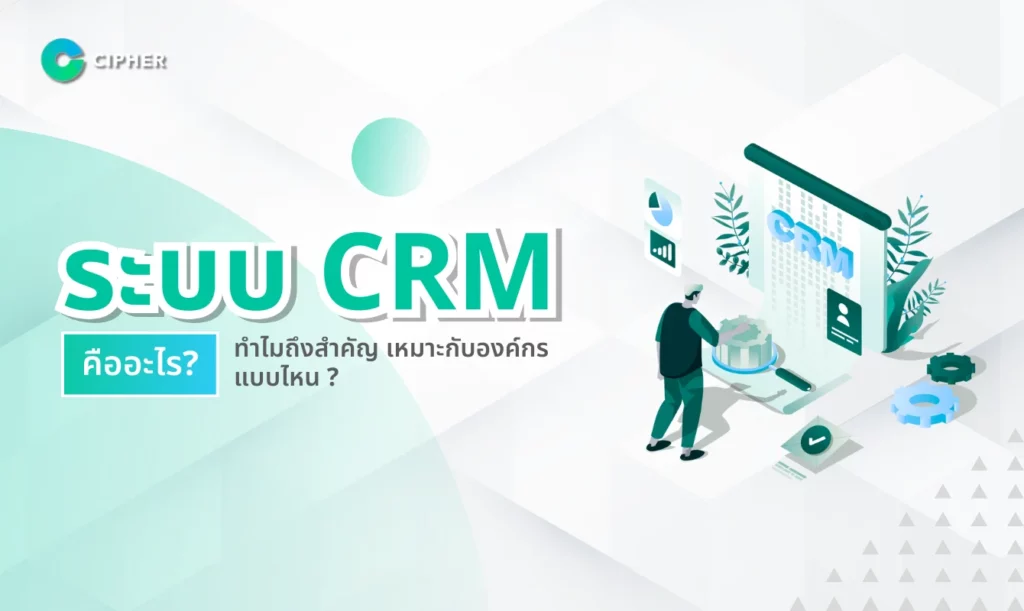Table of Contents
The CRM system is What? Why is it important for what kind of organization?
Today, CRM or Customer Relationship Management System is a key tool for managing business relationships in online marketing. CIPHER recognizes the importance of CRM as a service tailored to all business sizes to support customer growth.
The CRM system is What? Why is it important?

CRM stands for Customer Relationship Management System. CRM is a tool that enables organizations to systematically manage customer information, insight and communication patterns to meet customer needs, which will lead to long-term brand loyalty.
CRM is an important part of today’s business as it helps to better understand customers, provide appropriate services to meet their needs, and maintain their existing customer base, leading to increased sales, business growth and sustainable growth.
The CRM system is functional. What?
Not only is it a customer record system, but it also plays an important role for many organizations. It can be grouped into 4 main functions:
1. gather customer information
It’s like a large storage unit that collects in-depth information for each customer, from their last name, address, contact number, email to purchase history, special interest and interaction with all companies. This information is recorded in an orderly, always available.
2. analyze customer information and behavior
With customer information available, CRM also provides tools to analyze data, including segmentation of customers by age, area, purchasing behavior, value, etc., giving them a better overview and insight into sales and marketing strategies for each group.
3. Contact, communicate, talk to customers.
With CRM, it’s no longer difficult to communicate with customers because it’s one way to communicate via email, phone, chat or social media. You can instantly view, reply, and record conversations, enabling seamless customer service and a consistent customer experience.
4. select and offer appropriate products to customers
Using data and analysis, the CRM system will be a great help in introducing products to each customer. For example, offering special discount coupons to key customers at festivals, showcasing new products for those who love dressing or sending Biker promotional car accessories, etc., will not only boost sales. But it will also create satisfaction and a good image for Online Branding in the long run.
The CRM system does. Anything?

In addition to the main function, the CRM system also has features that help support the following functions:
Marketing Automation
CRM automates marketing activities, including email campaigns, customer segmentation, advertising campaign metrics, enabling marketers to plan and execute more efficiently.
Customer Service
With CRM’s Ticket and Knowledge Base, teams can quickly and effectively solve problems and answer customer questions, and track post-implementation satisfaction to improve service quality.
Sale Automation
The CRM system also automates sales teams in many areas, such as allocating leads to cells, creating quotas, recording sales activity data, analyzing and forecasting sales to improve sales efficiency.
Benefits of the CRM System
When all functions are in the CRM system, it can be seen that CRM provides comprehensive benefits to the entire organization, whether or not.
- Better management and utilization of customer information, meeting more on-the-spot requirements
- It saves staff working hours and improves overall operational efficiency.
- Build customer satisfaction and loyalty when closely and directly supervised.
- In addition, the company has been able to provide in-depth information to more accurate marketing plans and strategies to respond to target groups.
- Drive business growth, increase corporate revenue and profit in the long run.
Most importantly, CRM works for all departments, not just sales or marketing. This is definitely worth the investment for organizations that want to become a leader in the business and gain a lasting edge over their competitors.
Why should you start using CRM?
For who? Many people may view CRM as a difficult or a high investment. In fact, implementing CRM in an organisation is more rewarding than expected, from efficient management, sales growth, and customer relationships, which are beneficial to long-term growth. Let’s see how investing in CRM. What’s the point of that?
Working Through Excel vs. CRM System
If your organization continues to use Excel to manage customer information, it means you are wasting time and business opportunities because managing information with Excel is difficult and slow compared to CRM systems designed to manage customer information and share information between teams and analyze it for further sales and marketing in one click.
The CRM system benefits all departments in the organization.
In addition to directly benefiting sales and marketing, CRM data can be used in all departments. For example, manufacturing can plan production to meet market needs. Customer service can use the data to improve service delivery and other departments can use it to develop internal processes more efficiently.
CRM and CIPHER can be started today!
Whether your business is just beginning or already large, CIPHER is ready to provide CRM that meets all requirements from small enterprise packages to fully integrated CRM systems, with close guidance and supervision by a team of experts to maximize the benefits of CRM applications. Please consult or test.
Summary
CRM is an important tool that businesses should not overlook because it will not only help build good relationships with customers but also drive long-term growth and success. CIPHER is a partner in CRM deployment for all businesses to get the most out of this technology. Contact us for free advice and get started using CRM today.
Frequently Asked Questions (FAQs)
The Software CRM system is What?
CRM software is a program or application designed to help organizations manage customer relationships by integrating a variety of functions, such as recording customers, managing leads, reporting, marketing plans, etc. CRM software often works through the cloud to be accessible from anywhere, anytime.
What are the CRMs?
There are many CRM providers in the market, including Software as a Service (SaaS) cloud-based and On-Premise, installed on enterprise servers. Examples of leading CRM providers include Salesforce, Microsoft Dynamics, Oracle, SAP, HubSpot, Pipedrive, and Zoho. Each of them has a unique business-friendly characteristics.
CRM Tools Available Anything?
CRM tools vary depending on the provider, but the main features usually include:
- Customer Database – Customer Database
- Lead & Deal Management – Target Customer Management
- Sales Force Automation – Automation to support sales
- Marketing Automation – Marketing automation tools
- Analytics & Reporting – Analysis and Reporting
- Customer Support – Help and Customer Service Systems
How many forms of CRM do you have? Anything?
There are many forms of CRM divided by usage characteristics such as:
- Operational CRM – Focus on day-to-day work, sales, marketing, services
- Analytical CRM – Focus on analyzing customer data to plan strategy
- Collaborative CRM – Focus on cross-functional collaboration to serve customers in the same direction.
Or may be divided according to various industrial applications such as
- Sales CRM – Suitable for sales-oriented businesses
- Marketing CRM – Ideal for marketing and campaign planning
- Service CRM – It is suitable for businesses that focus on customer service.
CRM location is What?
The CRM or CRM Manager is responsible for the overall CRM deployment of the organisation, from process designation, strategy implementation to training and supporting users to optimize system utilization, and coordinate system providers to resolve problems, update systems, and continually improve applications.





